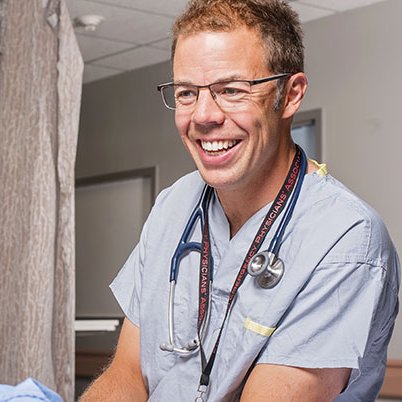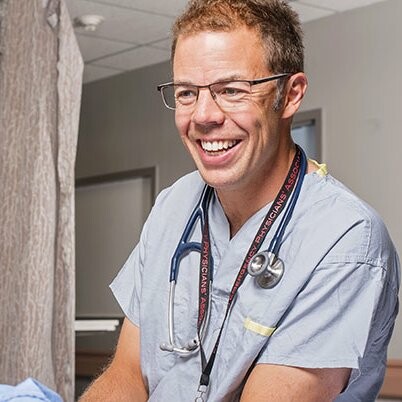Our Hospital, Our StoriesChanging the Approach to Patient Care
Posted on: Jan 31, 2019"There’s mindfulness to my patient interactions... I’ve changed the way I do things and I’m a better physician because of it." Dr. Cameron MacGougan says the summit has changed the way the team does business in one of Alberta's busiest emergency rooms.

Dr. Cameron MacGougan has been providing emergency care to patients of the Royal Alex for more than 14 years. He recently renewed his focus on empathy and understanding at the hospital’s annual Patient Provider Experience Summit.
The summit is supported by donors to the Royal Alexandra Hospital Foundation, and it’s dedicated to making progress in empathy, understanding and communication in the delivery of health care. MacGougan says the summit has changed the way the team does business in one of Alberta’s busiest emergency rooms.
MacGougan: The summit opened with a story about Barbara. Barbara had a massive pulmonary embolism—a clot in her lungs—we identify it, we save her life. We’re amazing! Belly-bumping, back-slapping, good job us! We gave her the clot-buster drugs and she lives and she goes home, and doesn’t end up in a nursing home. It’s amazing.
And then we hear that her experience was actually horrific. She was left in a hallway wondering what was happening to her. She wasn’t provided with the personal hygiene items she needed to maintain her dignity. We provided health care to Barbara, but no one cared for her personal needs.
There was this whole other piece, this human side of the equation that we missed. We dropped the ball and for Barbara that meant everything. When I heard this, I was in shock.
The conference was a call to arms, to discover how to provide a better experience for Royal Alex patients. I realized I need to focus on the emotional element of my patient encounters to communicate effectively with someone in crisis. It takes incredible nuance to be a great communicator. The summit has changed the way I provide care for the better. I’ll give you an example.
You knock on the door or jingle the privacy curtain and introduce yourself. You smile, you look them in the eyes, and ask “How can I help you today?” It’s an open-ended question that gives the patient the floor.
There’s mindfulness to my patient interactions that was lacking. I nod, listen and acknowledge their feelings. I never interrupt. And when they pause and wait for my response I put on my medical hat and get the information I need to provide care. But first I summarize what I heard, asking, “Do I have that right?”
I’ve changed the way I do things and I’m a better physician because of it. Part of that is setting better expectations for my patients.
I had a patient from a small town. He was suffering from chronic lower back pain. He’d seen his family doctor about it and that doctor sort of dumped him. He told him that he needed a “big-city” test, an MRI. This patient took that advice to heart and jumped in his car and drove three hours to the Royal Alex, landing on my caseload in the emergency room. He was expecting that I could arrange a big-city test that day. The patient’s expectations were set poorly by his family doctor and I knew our conversation had the potential to go poorly as well.
My job as an emergency physician was to rule out certain conditions and, once I had done that, from an emergency physician point of view my job was done. Instead, I chose to enter the room with empathy and understanding. I let him talk. I heard how frustrated he was, I learned that he’d lost his job and was worried about losing his house and being able to feed his children.
“I’m not going to cure you,” I told him. “I wish I could, but I can’t. I’m not able to give you an MRI today, but here’s what I am going to do.” I placed his name on the waitlist for an MRI and assured him he would get the test he needed, just not today.
At the end of his appointment he felt listened to and cared for—isn’t that what we all want? Prior to the summit, this patient interaction may have gone differently.
I’m so thankful that donors to the Royal Alexandra Hospital Foundation believe in the changes made possible by the annual Patient-Provider Experience Summit. It’s important for donors to understand that we always work to improve, and because of them we’re focusing on the difference between care and caring. I thank them deeply for making this possible.
